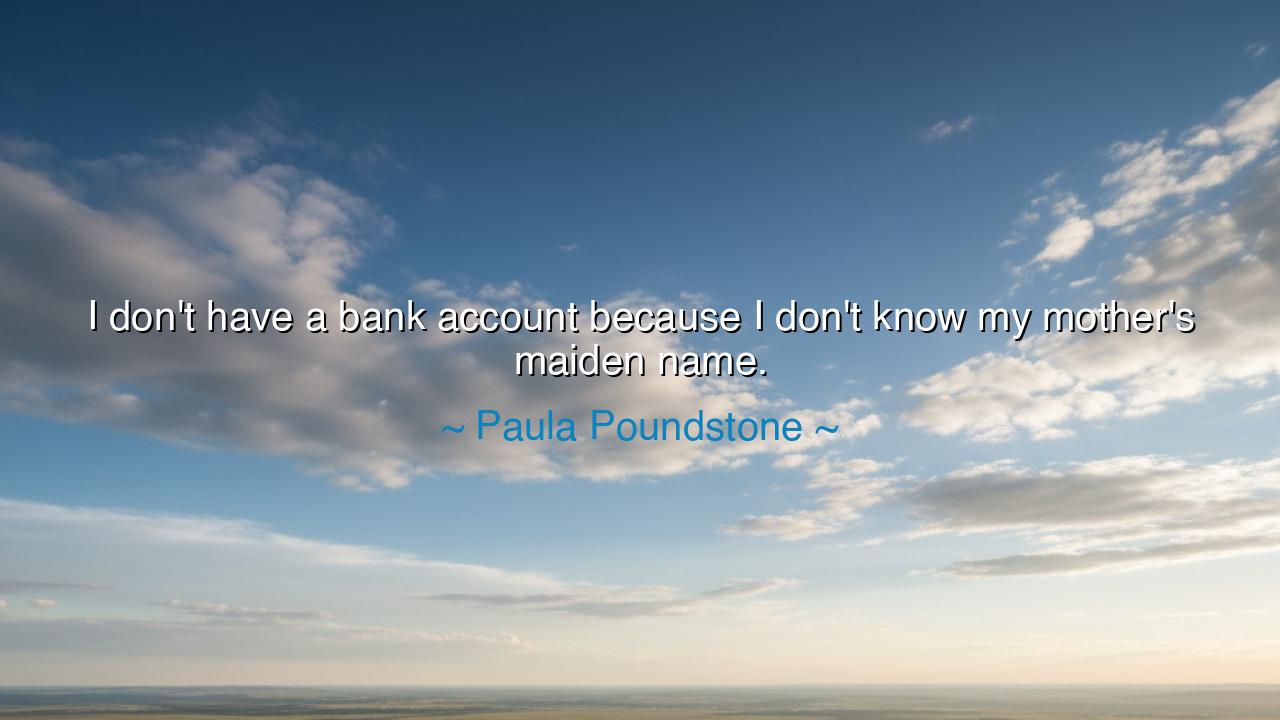
I don't have a bank account because I don't know my mother's






In the unfolding journey of human life, there are moments when humor becomes a vessel for deeper truths—truths that reflect our vulnerabilities, our uncertainties, and the complexities of our modern existence. Paula Poundstone, known for her sharp wit and observational humor, once remarked, “I don't have a bank account because I don't know my mother's maiden name.” On the surface, this statement may appear as a lighthearted quip, but beneath the humor lies a profound commentary on the nature of identity, security, and the sometimes absurd structures we create to safeguard our lives in the modern world.
In the ancient world, identity was often bound to the family, the lineage, and the name passed down through generations. The ancient Romans, for instance, placed immense value on the concept of the nomen, or the family name, as it represented both personal honor and the broader legacy of one’s ancestors. Cicero, the great statesman and philosopher, was not just Marcus Tullius Cicero—he was a descendant of a proud lineage, and his name carried with it the weight of generations before him. In the same way, Poundstone’s quip subtly calls attention to the modern, yet equally powerful, significance we place on personal identity, albeit in a much more bureaucratic and impersonal context. The question of one’s identity is no longer just a matter of name, but of secret codes, passwords, and systems that protect us in a world of financial institutions, digital networks, and surveillance.
The humor in Poundstone’s words speaks to the absurdity of our modern systems of identity verification. The reliance on mother's maiden name as a key to accessing one’s own wealth or information might seem trivial, yet it underscores how fragile and easily manipulated our sense of security has become. The ancient Greeks, for example, had their own means of ensuring trust and identity, often relying on face-to-face interaction and the honor of reputation within their community. While these methods were not perfect, they were far less dependent on arbitrary systems that can be forgotten or hacked. The notion that Poundstone, in jest, admits to not having a bank account simply because of an inability to recall such a detail reflects the flimsy nature of modern systems designed to protect us.
In the time of Alexander the Great, a man’s identity was known not by an obscure password or a forgotten detail, but by the deeds he performed and the reputation he built among those who knew him. Alexander’s name was synonymous with conquest, leadership, and vision. The legacy of his actions lived on not because of a hidden question about his lineage, but because his actions spoke louder than any document or account could. Today, we find ourselves in a world where our identities are less about the deeds we perform and more about the details we memorize, the numbers we remember, and the systems that govern our access to resources.
The lesson embedded in Poundstone’s playful reflection is a profound one: security in the modern world, whether financial or personal, is often built upon fragile systems that leave us vulnerable to forgetting, misplacing, or misunderstanding what is truly important. The rise of digital systems and online security measures has created a paradox in which we are increasingly disconnected from the very systems that are supposed to keep us safe. We may find ourselves caught in a web of passwords, security questions, and cryptic codes—tools meant to safeguard our identities, yet in many ways, these tools can also serve to alienate us from the deeper, human aspects of identity that once defined our relationships with the world.
As we navigate this modern landscape, the practical action we must take is to question the systems we rely on for security and identity, and to be mindful of how fragile these systems truly are. Much like the ancient philosophers who questioned the very foundation of society, we must question the tools and institutions that govern our lives today. Do we truly understand the systems we depend on? Are we overly reliant on external structures to define who we are, or do we have the strength to define our own worth, reputation, and value without being tied to arbitrary questions and digital systems?
In the end, Paula Poundstone’s wisdom reminds us of a timeless truth: our identities, our sense of security, and our lives are shaped not by the systems and details we memorize, but by the actions we take and the values we hold. Let us take the lessons from both the ancients and the modern world to heart, remembering that true security and identity lie not in passwords or hidden answers, but in the strength of our character, the reputation we build, and the meaning we bring to the world.






AAdministratorAdministrator
Welcome, honored guests. Please leave a comment, we will respond soon